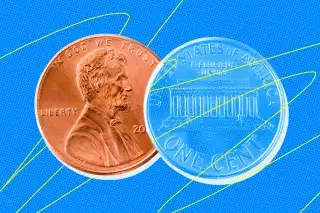Penny Shortages Are Hitting Stores Across the Country

Somewhere between your couch cushions and your car’s cupholder likely lives a small fortune of lost pennies.
Those little coppery coins (which are actually mostly made of zinc) have always had a way of disappearing. But after a little more than two centuries in circulation, the U.S. Mint plans to retire the penny — and retailers are finding out just how much those cents add up.
Businesses across the country are already reporting penny shortages that change the way cash is handled at the register. At a Sheetz convenience store in south-central Pennsylvania, signs inform customers that pennies are in short supply and encourage alternative payment methods. Shoppers are asked to use cashless payment options, round up their total for charity or even trade in $1 worth of pennies in exchange for a free drink.
Meanwhile, Kwik Trip, a popular Midwest convenience store chain, announced that all cash purchases at its locations will be automatically rounded down to the nearest five cents until a permanent legislative solution is enacted.
But the bigger challenge is the lack of guidance on what retailers are allowed — or expected — to do.
"The thing that convenience stores most want is clarity from a federal level on how to address this, because right now there is not sufficient clarity," Jeff Lenard, vice president of media and strategic communications at the National Association of Convenience Stores (NACS), tells Money. "And because of that, retailers are faced with one of three bad decisions."
Basically, he says, they can round down, round up or go cashless.
Rounding down could cost the industry millions each day. The NACS estimates that if every convenience store were to do this, the industry would lose about $1.2 million a day.
On the other hand, rounding up could create legal or regulatory risks, including complications for Supplemental Nutrition Assistance Program (SNAP) customers, minimum pricing on products like tobacco or milk, state fuel signage regulations or check-cashing accuracy.
The third option — encouraging customers to switch to plastic — is also problematic because swipe fees can outweigh both losses from rounding, making convenience stores lose part of what makes them convenient.
Why everyone's confused about pennies
To be clear, pennies are still in production for now. This is only the beginning of what will be a massive shift. The U.S. Department of the Treasury placed its final order in May for the blank metal discs used to mint the one-cent coin. Once those blanks are exhausted — expected to occur in early 2026 — new pennies will no longer be made.
Officials estimate that ending penny production could save the federal government about $56 million each year. And there's precedent: Other countries have already ditched their one-cent coins, citing similar cost and efficiency concerns. But in the U.S., shortages weren't expected for another couple of months, so many merchants have been caught off-guard. Questions remain about how cash transactions will be handled without pennies in circulation — and how consumers will adjust.
Complicating matters further, certain American cities and states actually require that retailers have cash and provide proper change.
Areas such as Berkeley and San Francisco in California; Washington, D.C.; Miami; New York City, Philadelphia; and King and Snohomish County in Washington all have exact-change rules. Likewise, the states of Delaware, Connecticut and Oregon require retailers to provide exact change. In these locations, rounding isn't legally an option, leaving retailers to figure out other ways to adapt.
Lenard says that several bills in Congress aim to address the penny's retirement. For example, the Common Cents Act would formally end penny production and allow cash transactions to be rounded up or down to the nearest nickel.
But with legislative progress stalled due to the ongoing government shutdown, retailers are left navigating the shortage without official guidance.
More from Money:
How Small Businesses Can Win the Holiday Rush Without Breaking the Bank
Gas Prices Just Dipped Below $3 for the First Time This Year. Will It Last?
What ‘Life-Changing’ Money Means to 10 People — and How They'd Spend It